Understanding drone pilot certification for sports events is essential for ensuring safety and compliance. You need to obtain an FAA Part 107 certification, which demonstrates your knowledge of regulations and safety protocols. This certification requires passing a knowledge test covering topics like airspace rules and operational limitations. Certified pilots can operate under guidelines that keep drones within visual line of sight and below 400 feet. It's also crucial to coordinate with local authorities for airspace restrictions. By mastering these requirements, you'll elevate your role in sports events, making a significant impact in aerial coverage and more. Further details await you.
Importance of Drone Certification
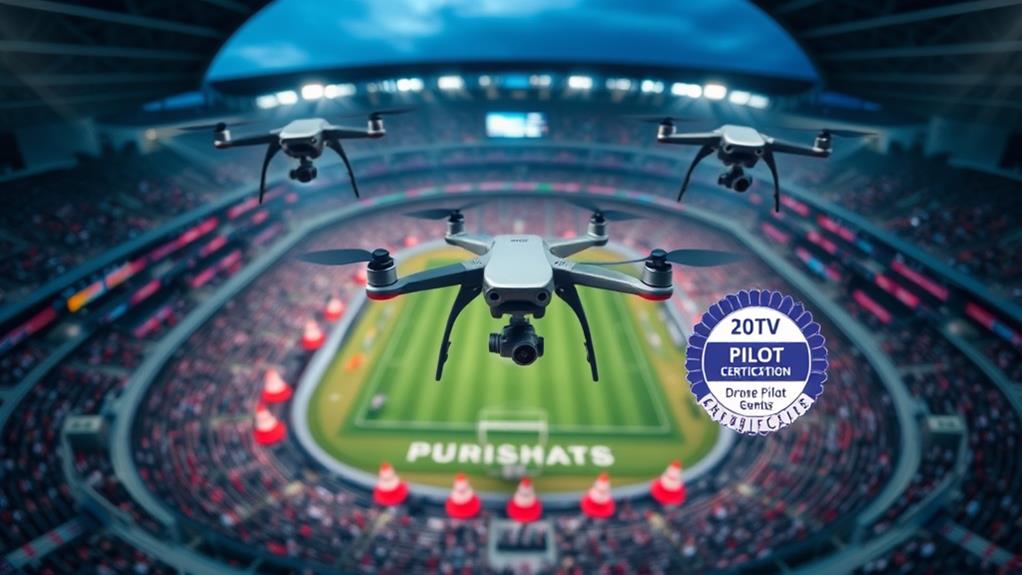
When you're flying a drone at a sports event, certification isn't just a nice-to-have; it's fundamental for ensuring safe and legal operations.
Drone certification, particularly under FAA Part 107, is necessary for commercial drone pilots. This certification confirms that you understand aviation regulations, airspace restrictions, and safety protocols, which is essential given the FAA's emphasis on FAA drone registration guidelines.
By obtaining your FAA Part 107 certification, you demonstrate a competent grasp of important topics like weather, drone operations, and regulatory compliance. This knowledge is crucial, especially in crowded environments typical of sports events, where the risk of accidents increases considerably.
Certified pilots can enhance the quality of aerial footage and data collection, creating stunning visuals for live broadcasts and event documentation. Furthermore, having a certified drone pilot gives you a competitive edge in the sports industry. Many organizations prefer or require certified operators to mitigate insurance and liability concerns.
FAA Regulations for Sports Events
When you're operating a drone at a sports event, knowing the FAA regulations is vital for safe and legal flying.
Compliance with established safety standards and protocols is essential to mitigate risks and guarantee the safety of all attendees. You'll need to keep your drone within 400 feet and maintain a clear visual line of sight, which can be tricky in crowded venues.
Additionally, you might need a Special Airworthiness Certificate and must coordinate with local authorities and event organizers to comply with airspace restrictions, as local drone laws greatly impact operational procedures.
Operational Limitations Overview
Drone operations at sports events face strict operational limitations under FAA regulations to guarantee safety and compliance. You need a Remote Pilot Certificate under Part 107 if you want to operate drones for commercial purposes at these events.
One of the key operational limitations is that you must keep your drone within visual line-of-sight, which is vital for real-time decision-making, and can't exceed a maximum altitude of 400 feet. Additionally, operations over people are generally restricted, but you can apply for specific waivers if you have detailed safety justifications. This means that flying directly over spectators is possible but requires careful planning and approval, particularly emphasizing the importance of thorough pre-flight checks.
Night operations are also prohibited unless you secure a special waiver. Obtaining this waiver demands a thorough application process that includes a detailed safety assessment.
Furthermore, you must adhere to temporary flight restrictions (TFRs) that may be enacted during major sporting events. These TFRs can limit or completely prohibit drone operations in specific airspace, ensuring that safety is prioritized.
Understanding these operational limitations is essential for any drone pilot looking to operate in the dynamic environment of sports events.
Compliance With Safety Regulations
Operating drones at sports events requires strict adherence to FAA regulations to guarantee safety and prevent incidents. As a drone pilot, you must comply with various safety regulations, including maintaining a maximum altitude of 400 feet and ensuring your drone stays within your visual line of sight at all times. This is essential for avoiding accidents and ensuring the safety of attendees.
If you're planning to operate over people or during nighttime events, special waivers may be necessary. Many drone pilots submit waiver requests for these scenarios, highlighting their significance in compliant operations.
To legally operate drones for commercial purposes at sports events, you need a valid Remote Pilot Certificate under FAA Part 107.
Pre-event coordination with local authorities and event organizers is imperative. This helps to clarify safety regulations and mitigate risks in crowded environments.
Additionally, continuous education on FAA updates and safety requirements is important. By staying informed, you can effectively navigate the compliance challenges that come with flying drones at sports events.
Eligibility Criteria for Certification
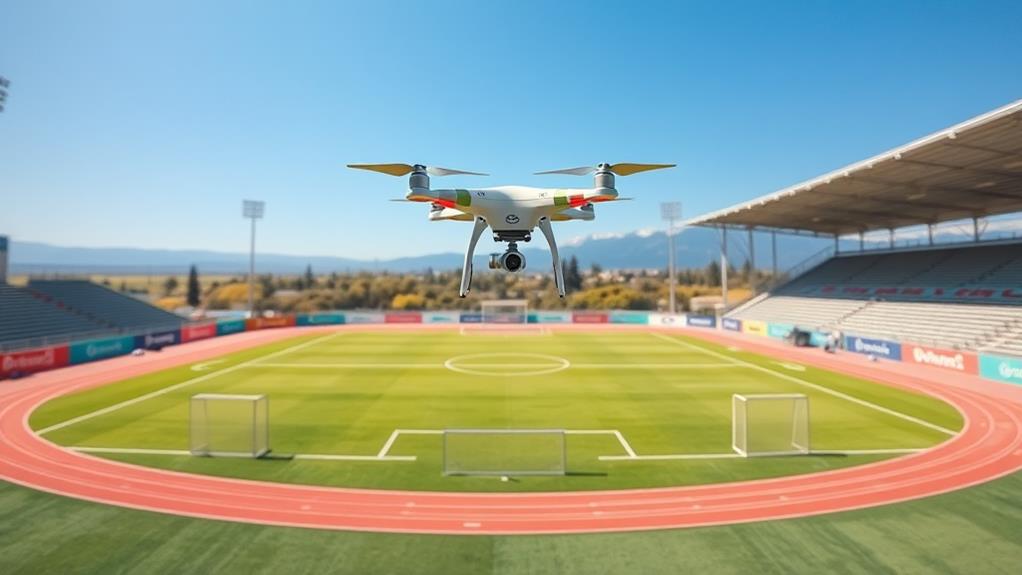
To qualify for drone pilot certification, you need to meet several key eligibility criteria set forth by the FAA. First, you must be at least 16 years old and demonstrate proficiency in reading, writing, and speaking English. This is vital since understanding airspace regulations and safety protocols is essential for safe drone operations.
You'll also need to successfully pass the FAA's knowledge test, which assesses your understanding of various topics, including airspace classifications and drone regulations. Additionally, a criminal background check is conducted by the TSA, ensuring you have no prior convictions related to aviation.
While the FAA doesn't explicitly require a medical certification for the Part 107 certification, it's important that you meet the physical and mental conditions necessary for safe drone operation.
Preparing for the Knowledge Test
Preparing for the FAA knowledge test requires a focused approach to guarantee you grasp essential concepts effectively. To succeed, you should dedicate around 15-20 hours of study time using the FAA's Remote Pilot – Small Unmanned Aircraft Systems Study Guide. This guide covers key topics like airspace classifications and weather patterns.
Here are some strategies to enhance your preparation:
- Familiarize yourself with FAA regulations, including altitude restrictions and operational limitations.
- Take advantage of online training courses that offer additional insights and practice opportunities.
- Utilize practice exams available online to reinforce your knowledge and improve your test-taking skills.
Remember that you need a passing score of 70% or higher to obtain your remote pilot certificate.
The FAA exam is usually conducted at FAA-approved testing centers, lasts about 2.5 hours, and requires an application fee ranging from $150 to $200.
Taking the FAA Knowledge Test
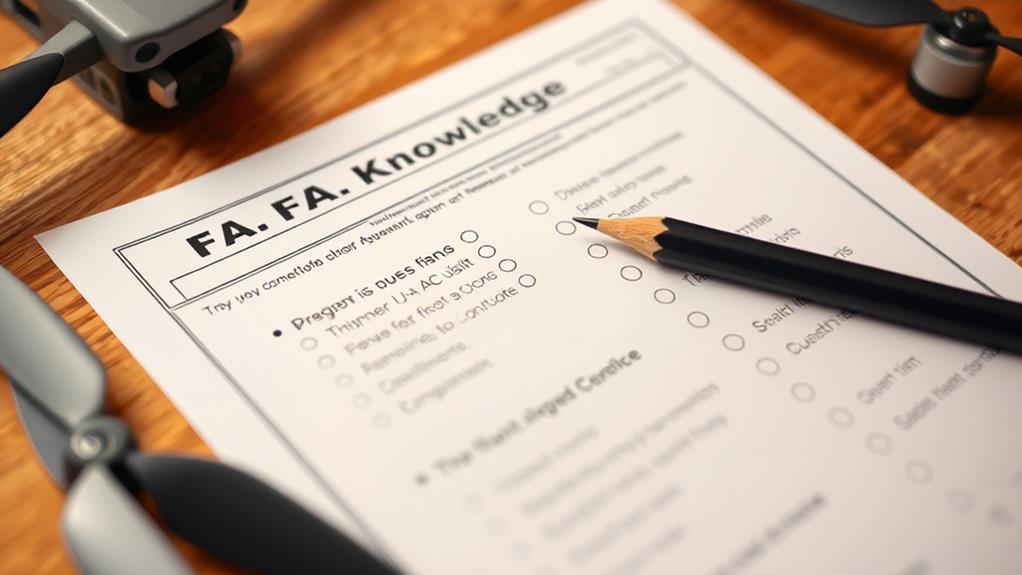
When you're ready to take the FAA Knowledge Test, you'll face 60 multiple-choice questions covering essential topics like airspace classifications and regulations.
It's vital to use the FAA's Remote Pilot Study Guide to prepare effectively, as a passing score of 70% or higher is required.
You can schedule your test at one of the 690 FAA-approved testing centers across the country, so find one that works best for you.
Test Format Overview
The FAA Knowledge Test for drone pilots is a crucial step in obtaining your Remote Pilot Certificate. This aeronautical knowledge exam consists of multiple-choice questions that cover essential topics like airspace classifications, regulations, and drone operations. It typically lasts around 2.5 hours, and you'll need a passing score of 70% or higher to qualify for your certificate.
Here's what you should know about the test:
- Test fees usually range from $150 to $200.
- It's administered at FAA-approved testing centers across the country.
- Preparation is key, so utilizing study materials like the FAA's Remote Pilot – Small Unmanned Aircraft Systems Study Guide is highly recommended.
- Online practice exams can help you get familiar with the test format.
Successful completion of this test is a prerequisite for applying for the Remote Pilot Certificate via FAA Form 8710-13 in the IACRA system.
Study Materials Recommended
To ace the FAA Knowledge Test, utilizing the right study materials is essential for your success. One of the best resources available is the FAA's Remote Pilot – Small Unmanned Aircraft Systems Study Guide. This guide lays out the regulations and operational standards you'll need to know for the test.
Additionally, consider enrolling in online courses and tutorials, such as those offered by DARTdrones. These structured learning paths can greatly enhance your understanding and improve your chances of passing the exam.
Familiarizing yourself with key topics like airspace classifications, weather patterns, and drone operation regulations is critical, as these subjects are heavily featured in the FAA knowledge test.
The test itself consists of 60 multiple-choice questions, and you'll need a minimum passing score of 70%. To gauge your readiness, take advantage of practice exams available online. These exams provide sample questions under timed conditions, allowing you to assess your understanding effectively.
Test Center Locations
Finding a nearby test center for the FAA Knowledge Test is easier than you might think. The FAA boasts over 690 approved test center locations across the United States, providing aspiring drone pilots ample options for certification.
These centers are conveniently scattered throughout various cities, making it accessible for you to find one close by.
When you're ready to schedule your test, keep these points in mind:
- Each testing center offers the FAA Part 107 exam format, which includes multiple-choice questions related to drone operations.
- You can easily book your appointment through the FAA's IACRA system, ensuring a smooth registration process.
- Arrive at the testing center with valid identification to validate your identity on test day.
- It's a good idea to review the specific requirements of your chosen test center, as they may vary.
Application Process Overview
Steering through the application process for drone pilot certification is straightforward if you follow the necessary steps.
First, you need to obtain an FAA Tracking Number (FTN) through the Integrated Airman Certification and Rating Application (IACRA) system. This number is vital, as it allows you to schedule your knowledge test appointment at one of the 690 FAA-approved testing centers nationwide.
Once you've secured your FTN, you can take the FAA Part 107 exam. Passing this test is essential, as it demonstrates your understanding of the regulations and safety protocols necessary for operating a drone.
After successfully completing the exam, you'll need to fill out Form 8710-13 in IACRA to apply for your remote pilot certificate.
During the application process, the FAA requires identity verification. Be prepared to present necessary documentation to an FAA representative.
After signing and processing your application, you can expect to receive a temporary certificate within a week, while your permanent certificate will be mailed to you shortly after.
Following these steps guarantees you're well on your way to becoming a certified drone pilot for sports events.
Maintaining Your Certification
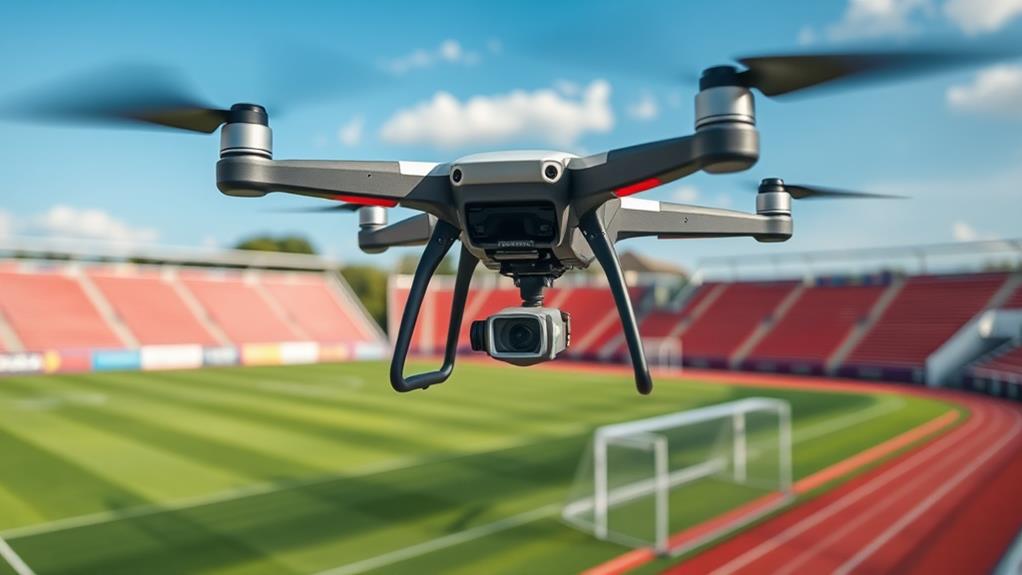
After obtaining your drone pilot certification, keeping it valid and up-to-date is essential for your continued success in the field.
To maintain your certification, the FAA requires you to undergo recurrent training every 24 months. This guarantees you stay informed about the latest regulations and operational practices.
Luckily, the FAA offers the Part 107 Small UAS Recurrent (ALC-677) course at no cost, making it easier for you to meet your renewal requirements.
Here are key steps for maintaining your certification:
- Complete recurrent training: Stay current by fulfilling the FAA's training requirements.
- Log your flight hours: Documenting your experience enhances your credibility as a drone operator.
- Participate in safety seminars: Engage in workshops to learn best practices and regulatory updates.
- Pursue continuous education: Utilize online courses to keep your aerial knowledge and skills sharp.
Safety Considerations for Sports Events
When operating drones at sports events, safety must be your top priority. Adhering to FAA regulations is vital; this means maintaining a safe distance from crowds and not flying above 400 feet. These guidelines help guarantee the safety of spectators and participants alike.
Before each flight, you should conduct thorough pre-flight checks to confirm that your equipment is functioning properly. This proactive approach can prevent malfunctions that might pose risks during high-attendance events.
Understanding airspace restrictions is equally important. Many sports venues are located near airports, requiring you to obtain necessary waivers for operations in controlled airspace.
Additionally, utilizing spotters during drone operations can enhance safety by helping you maintain visual line of sight, which is essential for avoiding potential collisions with spectators or other drones.
You should also have an all-encompassing safety plan in place. This plan should detail emergency procedures and communication protocols to follow in case of unforeseen incidents during the event.
Career Opportunities in Drone Sports
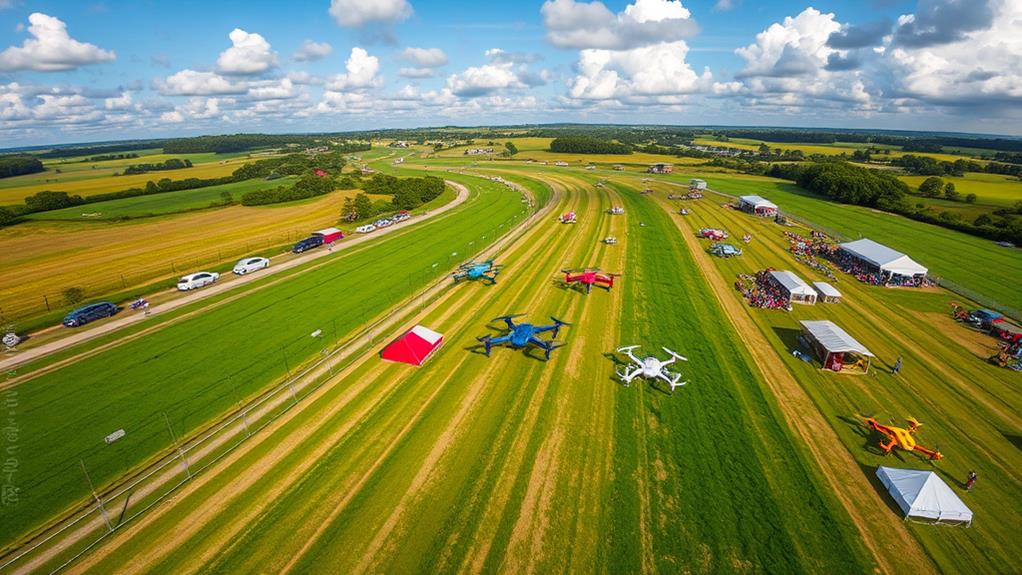
As the drone sports industry expands, new job roles are emerging that you might find exciting.
You'll need specialized skills and training to excel in areas like racing, event coordination, and media operations.
Emerging Job Roles
The rise of drone sports has opened up exciting career opportunities for aspiring pilots. As the popularity of drone racing leagues and events grows, you'll find numerous roles emerging in this dynamic field.
Here are some key job opportunities for certified drone pilots:
- Competitive Aerial Racing: Specialize in drone racing, where pilots can earn sponsorships and prize money.
- Aerial Cinematography: Work with sports events to capture stunning footage, providing unique perspectives that enhance broadcasts.
- Sports Analytics: Collaborate with teams to gather data through aerial mapping, improving strategies and performance assessments.
- Event Coverage: Help event organizers by providing live streaming services, enhancing audience engagement with immersive experiences.
With the increasing demand for drone pilots, especially those skilled in aerial cinematography and data collection, you can carve out a niche for yourself.
Freelance opportunities also abound at local competitions and community events, allowing you to build your professional network.
Required Skills and Training
To thrive as a drone pilot in the fast-paced world of sports events, you'll need a specific set of skills and training. First, you must master operating high-performance drones that can capture dynamic aerial footage and live streams, essential for fast-paced activities. Proficiency in aerial cinematography is significant; understanding framing, lighting, and composition guarantees you create visually compelling content for broadcasts.
Moreover, you'll need to familiarize yourself with FAA regulations regarding drone operations, particularly in crowded venues. Compliance is imperative for safe flights near spectators and athletes. Proper training programs will emphasize real-time decision-making and communication skills, enabling you to work efficiently with production teams and event organizers.
Career opportunities in this niche field are diverse. You could become an aerial cinematographer, a drone racing pilot, or a drone operator for sports media companies.
The potential salaries in these roles can range from $50,000 to $100,000 annually, making this a lucrative career choice. With the right skills and training, you can excel as a drone pilot, contributing to the exciting world of sports events.
Resources for Aspiring Drone Pilots
For aspiring drone pilots, accessing the right resources is essential to mastering the skills needed for success in sports event operations. Start by familiarizing yourself with the FAA's Remote Pilot – Small Unmanned Aircraft Systems Study Guide, which is an important tool for preparing for the FAA Part 107 knowledge test. This guide covers vital regulations and operational principles.
Consider these additional resources for aspiring drone pilots:
- Online Courses: Platforms like DARTdrones offer extensive training and practice exams, boasting a 99% pass rate for the Part 107 certification.
- FAA Safety Team (FAASTeam): Attend seminars and utilize resources that help you stay updated on regulations and best practices for safe drone operations.
- Drone Registration: Remember, registering your drone through the FAA is necessary, and you'll need to renew this registration every three years.
- Professional Organizations: Joining networks can provide valuable insights, networking opportunities, and access to tailored training resources specific to sports event applications.
Conclusion
In summary, obtaining drone pilot certification for sports events opens a world of opportunities. By understanding FAA regulations and preparing thoroughly for the knowledge test, you're not just flying a drone; you're steering through a sky filled with potential. Remember, safety is paramount, and staying certified keeps you in the game. As you pilot your drone through the vibrant atmosphere of sports, you'll be part of something larger, capturing moments that soar above the competition.
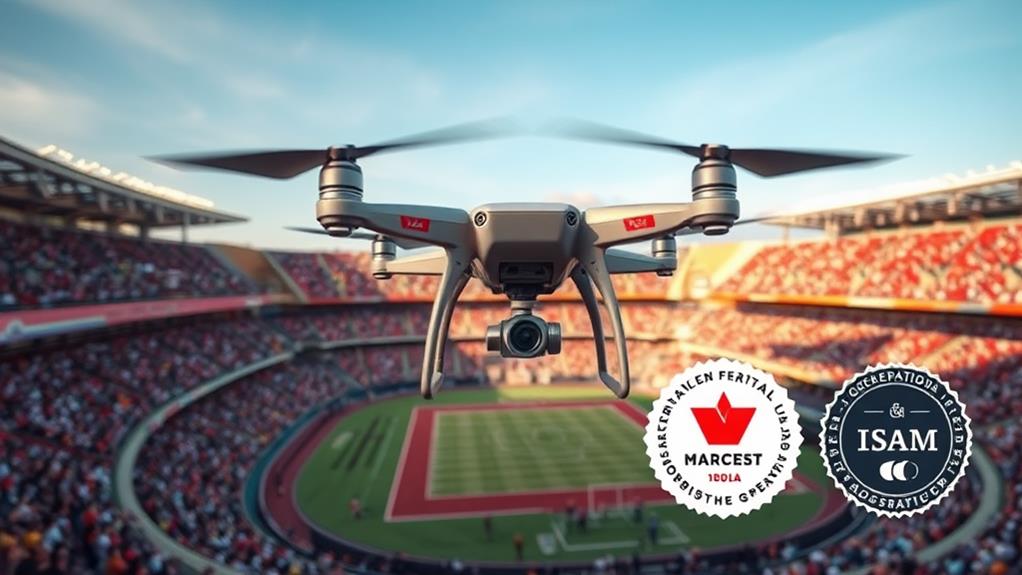
Leave a Reply